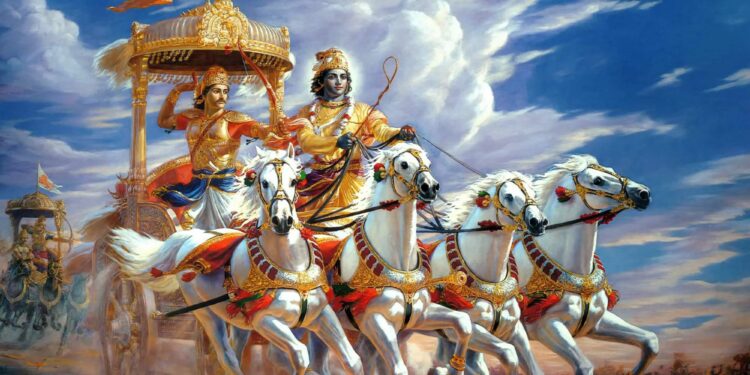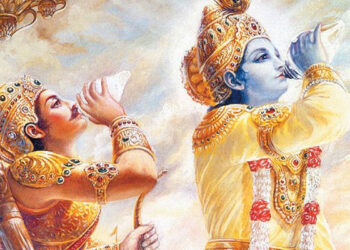TEXT 4
na karmaṇām anārambhān
naiṣkarmyaṁ puruṣo ‘śnute
na ca sannyasanād eva
siddhiṁ samadhigacchati
SYNONYMS
na—not; karmaṇām—of prescribed duties; anārambhāt—by nonperformance; naiṣkarmyam—freedom from reaction; puruṣaḥ—a man; aśnute—achieves; na—nor; ca—also; sannyasanāt—by renunciation; eva—simply; siddhim—success; samadhigacchati—attains.
TRANSLATION
Not by merely abstaining from work can one achieve freedom from reaction, nor by renunciation alone can one attain perfection.
PURPORT
The renounced order of life can be accepted when one has been purified by the discharge of the prescribed form of duties which are laid down just to purify the hearts of materialistic men. Without purification, one cannot attain success by abruptly adopting the fourth order of life (sannyāsa). According to the empirical philosophers, simply by adopting sannyāsa, or retiring from fruitive activities, one at once becomes as good as Nārāyaṇa. But Lord Kṛṣṇa does not approve this principle. Without purification of heart, sannyāsa is simply a disturbance to the social order. On the other hand, if someone takes to the transcendental service of the Lord, even without discharging his prescribed duties, whatever he may be able to advance in the cause is accepted by the Lord (buddhi-yoga). Sv-alpam apy asya dharmasya trāyate mahato bhayāt. Even a slight performance of such a principle enables one to overcome great difficulties.
TEXT 5
na hi kaścit kṣaṇam api
jātu tiṣṭhaty akarma-kṛt
kāryate hy avaśaḥ karma
sarvaḥ prakṛti-jair guṇaiḥ
SYNONYMS
na—nor; hi—certainly; kaścit—anyone; kṣaṇam—a moment; api—also; jātu—at any time; tiṣṭhati—remains; akarma—kṛt—without doing something; kāryate—is forced to do; hi—certainly; avaśaḥ—helplessly; karma—work; sarvaḥ—all; prakṛti-jaiḥ—born of the modes of material nature; guṇaiḥ—by the qualities.
TRANSLATION
Everyone is forced to act helplessly according to the qualities he has acquired from the modes of material nature; therefore no one can refrain from doing something, not even for a moment.
PURPORT
It is not a question of embodied life, but it is the nature of the soul to be always active. Without the presence of the spirit soul, the material body cannot move. The body is only a dead vehicle to be worked by the spirit soul, which is always active and cannot stop even for a moment. As such, the spirit soul has to be engaged in the good work of Kṛṣṇa consciousness; otherwise it will be engaged in occupations dictated by illusory energy. In contact with material energy, the spirit soul acquires material modes, and to purify the soul from such affinities it is necessary to engage in the prescribed duties enjoined in the śāstras. But if the soul is engaged in his natural function of Kṛṣṇa consciousness, whatever he is able to do is good for him. The Śrīmad-Bhāgavatam (1.5.17) affirms this:
tyaktvā sva-dharmaṁ caraṇāmbujaṁ harer
bhajann apakvo ‘tha patet tato yadi
yatra kva vābhadram abhūd amuṣya kiṁ
ko vārtha āpto ‘bhajatāṁ sva-dharmataḥ
“If someone takes to Kṛṣṇa consciousness, even though he may not follow the prescribed duties in the śāstras or execute the devotional service properly, and even though he may fall down from the standard, there is no loss or evil for him. But if he carries out all the injunctions for purification in the śāstras, what does it avail him if he is not Kṛṣṇa conscious?” So the purificatory process is necessary for reaching this point of Kṛṣṇa consciousness. Therefore, sannyāsa, or any purificatory process, is to help reach the ultimate goal of becoming Kṛṣṇa conscious, without which everything is considered a failure.


















